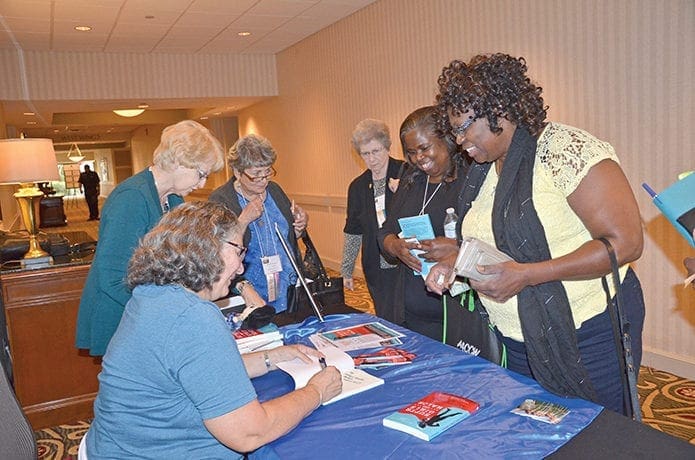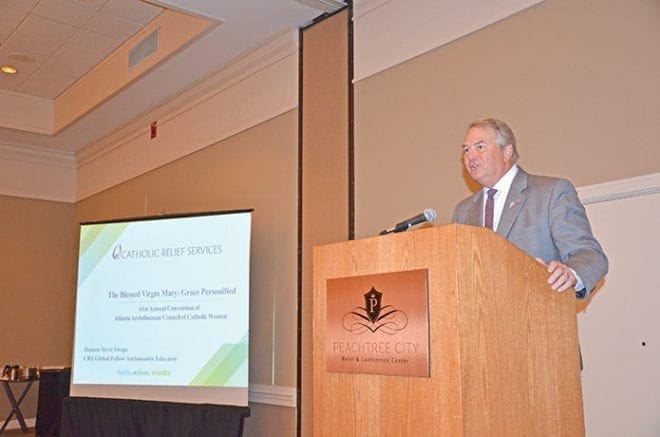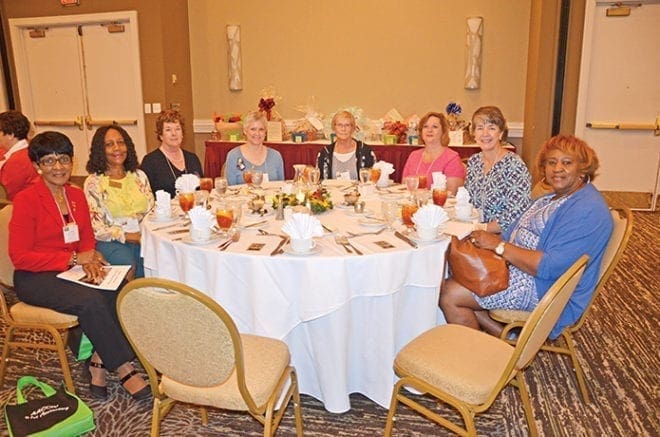 Photo by Cindy Connell Palmer
Photo by Cindy Connell PalmerPeachtree City
AACCW members ‘gather in the Grace of Mary’
Published November 27, 2017
PEACHTREE CITY—In his homily at the 61st annual convention of the Atlanta Archdiocesan Council of Catholic Women (AACCW), Archbishop Wilton D. Gregory acknowledged the “lots and lots of little things of charity” practiced by council members.
“Your outreach to women expecting children and their newborns; even the little things that you do, you fashion them into great signs of his love and generosity for his people,” said Archbishop Gregory. “At this convention there’s the sharing of the works of mercy and the outreach of social justice that you do effectively each and every day.”
The AACCW convention was held at the Peachtree City Hotel and Conference Center, Sept. 22-24, with 114 attending. The theme was “Gathered in the Grace of Mary.”
Members voted for new AACCW officers at the Saturday morning business meeting. New officers are Gwendolyn Scott, president; Cynthia Simien, president-elect; Jean Driskell, recording secretary; and Sherry Aquino, treasurer.
Father Tim Gadziala, pastor of St. Peter Church, LaGrange, is the new spiritual advisor for AACCW. Father Bill Williams, pastor of St. Gerard Majella Church, Fort Oglethorpe, stepped down as spiritual advisor after six years of service.
A call to help refugees
Deacon Steve Swope, who serves at St. George Church, Newnan, spoke about his experiences as a Catholic Relief Services Global Fellow at the Saturday luncheon.
Deacon Swope went to Greece and Serbia in 2016 to work with refugees, mainly Syrians, and said that he spent “time talking to these refugees to get to know their stories and who they are and why they’re running.”
“Twelve years ago there were 22 million Syrians,” Deacon Swope said. “Six million have left their country. One quarter of the population no longer lives there. They’ve left because they don’t want to die in a war.”
When the refugees get across the Aegean Sea, “the American Catholic Church is there with open arms to help them,” he said. “And the American Catholic Church is there through the generosity that you provide to Catholic Relief Services (CRS),” Deacon Swope said.
He said that one of the things he did with CRS was to meet people as they got off boats in the port of Athens, Greece. Along with CRS, other humanitarian groups meet them, give them bags of necessities and instructions on where to find shelter, food and how to continue northward into Europe, he said.
“Seventy percent of the people we saw were women and children,” he said. “Thirty percent were men. Most of the Syrians were traveling in intact families; husband and a wife and children. That’s what we saw when we were there. These were families running for their lives.”

Deacon Steve Swope, a Catholic Relief Services Global Fellow, was the keynote speaker on Saturday, Sept. 23, at the AACCW annual convention. He told attendees that they are “called to act” on behalf of those “fleeing death, destruction, and persecution.” Photo by Cindy Connell Palmer
Deacon Swope spoke about the Confront Global Poverty campaign of the U. S. Conference of Catholic Bishops and CRS.
“That whole campaign allows us to speak with one voice as the Catholic Church,” he said, “to those in power and tell them we should be a nation of immigrants and refugees welcoming those fleeing death, destruction, and persecution.”
“You and I are also called to act,” Deacon Swope said. “That means we have to speak to those around us; respectfully, but honestly and openly. These are people fleeing for their lives just as Joseph and Mary and Jesus were fleeing for theirs. We have a duty and obligation to protect them because they’re simply human beings. We have to protect their dignity.”
He also talked about giving, not only to CRS, but also to any number of humanitarian organizations that help refugees.
“If we look to the Blessed Mother, we can look at her strength, and we look at her grace, and the courage she had to venture into the unknown,” he said. “It’s our duty and our obligation as Christians to have that same strength and that same courage; to stand up to people and be their voice when they’re the voiceless.”
Faith must be the foundation
Shirley Radican, a past president of AACCW and past vice president to the National Council of Catholic Women, was the speaker for the spirituality workshop. She spoke of ordinary women doing extraordinary things and mentoring young women in AACCW and in their parish Councils of Catholic Women (CCW).
“With all of us gathered here today in the grace of Mary, we’re the ordinary women doing extraordinary every day of our lives,” Radican said.
She said ordinary Christian women become extraordinary when they weather a storm or stay calm in difficult times or just get along with troublesome people. They are happy and radiant in the middle of pressures and trials.
In 1920, “the bishops of the United States convened 200 Catholic women from all over the country and formed the National Council of Catholic Women,” Radican said. “The bishops formed us. They wanted the possibility of unifying all Catholic women together in one umbrella because we have a lot of different organizations under that umbrella. These women were tackling some of the same issues we’re faced with today—addressing the needs of the immigrants, the health of mothers and children, working conditions, pornography, clean water and the right to life. We can make a difference one woman at a time.”
She also spoke about inviting young women and mothers to their parish Councils of Catholic Women.
“If you want (them) to be a part of your future, we need to focus on six important things,” Radican said. “Those areas just happen to start with the letters of the word ‘future’ and that’s what we all want—a bright future for our church.”
She said that those letters represent faith, understanding, tenacity, unity, relationship and evangelization.
“Faith must be the foundation of all we do,” Radican said.
She encouraged members to be tenacious in spreading the Gospel and the council’s message. The essence of the church and council are united in faith and purpose.
“We’re all sisters in Christ, and we speak with one voice within our parish, our diocese, nationally and around the world,” she said.
Becoming missionary disciples
The Service workshop speaker, Maria Morera Johnson, presented “Living Our Lives and Vocations as Missionary Disciples.” Johnson is an award-winning author and speaker. Her latest book is “Super Girls and Halos: My Companions on the Quest for Truth, Justice, and Heroic Virtue.”
She had participants design their own coat-of-arms shield and divide it into four areas: “who we are, whose we are, our vocation and living our vocation as a tool for evangelization.”
She said that while teaching catechism is instructing those who want to learn the faith, evangelization is different.
“Evangelization goes out into the world where people don’t know Christ and introduces people to Christ,” she said.

Women of the Atlanta Archdiocesan Council of Catholic Women (AACCW) enjoy a lunch at the group’s 61st annual convention, held Sept. 22-24 at the Peachtree City Hotel and Conference Center. The theme was “Gathered in the Grace of Mary.” Photo by Cindy Connell Palmer
“We are carriers, like Mary, of Christ to the world,” Johnson said. “If you lead with ‘Jesus is the Son of God, the second part of the Holy Trinity,’ people are going to go ‘whatever, not interested.’ But if you talk about your personal encounter with Jesus Christ, it’s your story and they can’t say it didn’t happen.”
She asked participants to place in the first quadrant of the coat-of-arms a symbol of “who you are.”
“We are created in the image of God. It’s not enough to be good, we need to let grace into our lives, to work at becoming the disciples, these missionary disciples,” she said.
The second quadrant symbol shows “whose you are,” Johnson said.
“You are a daughter or son of the Father. The Father’s role is to love,” she said. “What is the son’s or daughter’s role? It is to receive the love. We really need to own that relationship and understand that God loves us. We can’t love unless we receive love. We have to know love to give love. We receive the ultimate love in the sacrifice of the cross.”
A symbol of vocation—marriage, holy orders or work vocation—comprises the third quadrant.
“What is your vocation?” Johnson asked. “That’s where you are going to do the work of evangelization,” said Johnson. “Tell your story to other people; that’s your evangelization.”
“Identify a strength that you have in that vocation,” she said. “In the fourth quadrant put a symbol of that strength. Take it to the Lord to use in his ministry and his kingdom.”
“My audience is and continues to be men and women who are seeking, who are looking for answers,” Johnson said. “They’re looking for the good and they don’t realize it that when you look for the good, they’re actually looking for God.”
‘Bloom where you’re planted’
Father Tim Gadziala spoke on his five-plus years of missionary experience in Jamaica at the convention’s Sunday brunch.
“God gives each place or locality a purpose and a mission. You have to bloom where you’re planted,” Father Gadziala said. “I had to learn to be Jamaican. The people were charming. I learned to rely and depend on my Jamaican community, not only the neighborhood, but the people I lived and work with. It was really, really wonderful.”
He quoted Pope Francis saying, “The church that goes forth is a community of missionary disciples who take the first step and are involved, supportive, rejoicing, and bearing fruit.”
“I learned this when I was in Jamaica,” Father Gadziala said. “I’m a better man for having been to Jamaica, thanks to Archbishop Gregory, and hopefully, a holier priest.”
“There’s so much abuse in that country,” he said. “One out of four girls are abused before the age of 18. That’s worse than America. One out of eight boys abused before they are 18 years old.”
Father Gadziala said abuse is prevalent among the rural poor of the Jamaica. He helped start a program to fight abuse on the island of Jamaica in 2012.
“A lady said to me, Father, what’s wrong letting my daughter get abused? I’m a survivor and I need my money,” Father Gadziala said.
“This is very sad when you see a parent who would willingly allow their child to be abused because of desperation of financial sustenance that’s there,” he said.
Father Gadziala said that the program became a template for the whole Caribbean region.
“That’s one of the things I think I was able to give to that country,” he said. “To help them with a safe environment, to build a safe Jamaica.”
Father Gadziala also helped develop an education commission for the Diocese of Mandeville, where he was vicar general.
While teaching Latin, he encountered a student who could not focus because of hunger.
The priest asked the student if she had eaten.
He said, “She looked at me and said, ‘No, it wasn’t my turn to eat. We have six family members and my momma wouldn’t give me anything to eat.’”
“I gave her a piece of bread and some juice and she was very happy,” he said. “I called her mother and talked to her.”
Father Gadziala said after talking to the principal, he learned the government provides one bag of rice each week.
“That’s the government’s support for children’s education,” he said.
With help from donors, Father Gadziala was able to offer before- and after-school meal programs so students would not go hungry.
“I was able to celebrate, in 2012, the 500th anniversary of Christianity in Jamaica,” he said. “That was a real, real awesome thing.
“I enjoyed my time in Jamaica,” Father Gadziala said. “It changed me as a priest.”
Jean Driskell contributed to this story.